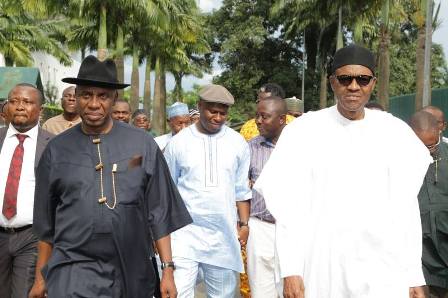By Femi Ogunshola, News Agency of Nigeria (NAN)
–
On Jan. 14, the presidential candidates of the 14 political parties that are participating in the March 28 presidential election signed an accord in Abuja to uphold peace before, during and after the elections.
Political pundits observe that by the agreement, popularly called the Abuja Accord, the candidates and their political par¬ties are committed to peaceful electioneering and effective management of the outcome of the elections.
They opine that the presence of former UN Secretary-Gen¬eral Kofi Annan and former Commonwealth Secretary-General Emeka Anyaoku at the signing ceremony of the agreement, underscores its importance.
President Goodluck Jonathan, the presidential candidate for the ruling Peoples Democratic Party (PDP) and Gen. Muhammadu Buhari, the presidential can¬didate for All Peoples Congress (APC) — the main opposition party — are among the political parties that signed the agreement.
The Office of the Special Adviser to the President on Inter Party Affairs, in conjunction with the National Security Adviser, facilitated the accord.
Observers note that political activities of PDP and APC have, however, attracted much public attention so much so that the other 12 candidates’ campaigns are less noticeable.
They also observe that the presidential election is going to be a straight contest between Jonathan and Buhari.
Sen. Ben Obi, the Special Adviser to the President on Inter party Affairs, said that the accord would serve as a platform for involving all stakeholders in delivering credible, free and fair elections.
He said that the key components of the peace accord included public sensitisation, youth education, peace building projects and community-wide awareness campaigns involving political, religious and traditional rulers.
“The processes will involve workshops, seminars and town hall meetings on a continuous basis to inculcate the habit of making peace among Nigerians,’’ he said.
Appraising the peace accord, Mr Bode Towoju, the Coordinator of Buhari Legacy Foundation, said that APC would not condone violence, urging the party members to desist from any act that could negate the aim of the accord.
He said that the party had embarked on sensitisation of its member at the grassroots to the importance of maintaining peace at all times.
Corroborating his viewpoint, Malam Garba Shehu, the Director of Media and Publicity of Buhari Campaign Organisation, said: “Nigeria is bigger than any political party or any individual and that the country’s greatness would outlive any election.’’
He said that Buhari had asked his supporters to ignore any distractions and remain focused on making the democratic process work.
But some analysts have observed that some political documentary programmes run on some television and radio stations negate the contents of the agreement.
Reacting to this, Mr Iyiola Oyedepo, the Chairman of PDP in Kwara, explained that revealing the past deeds of any political officer holders via such documentary programmes had not violated the guidelines of the agreement.
“Sponsorship of documentary programme on any politician aspiring to lead the people is not a violent act.
“It is part of politics, and I don’t see revelation of secret deal, fraudulent act or accumulation of wealth by any act of misdemeanour as a violation of peace accord,’’ he said.
He advised that security agencies should be receptive by dealing with any one that violated the provisions of the peace accord.
He said PDP had been maintaining peace always in its electioneering, calling on the party supporters to promote peace before, during and after the elections for sustainability of democracy.
Commending the peace accord, the National Orientation Agency (NOA), said that the accord would give stakeholders in politics the responsibility of ensuring peace in electioneering.
To promote the agreement, Mr Paul Odenyi, the Chief Press Secretary to the Director General of NOA, Mr Mike Omeri, said that the agency had embark on sensitisation of the public to the need for peace before, during and after the elections.
He said that the agency had created a tag –#wagepeace 2015– as a platform for creating awareness on the need to achieve peace in the electioneering process.
In his view, Mr Ayo Thomas, the Director-General, Forum of Emerging Young Socio-economic and Political Leaders, a non-governmental organisation, said that the level of sensitisation notwithstanding, the security agencies should be prepared to ensure the workability of the accord.
He said the accord was a form of undertaking among the major political stakeholders to sign up for peace in the process leading to the elections.
He also noted that since violence had been identified as one of the common occurrences during and after elections in Nigeria, the peace accord could be used to check violent political activities.
By and large, political pundits hold the belief that signing of the peace accord by the participating political parties in the general elections, particularly the PDP and APC, will add values to electoral process in Nigeria.







